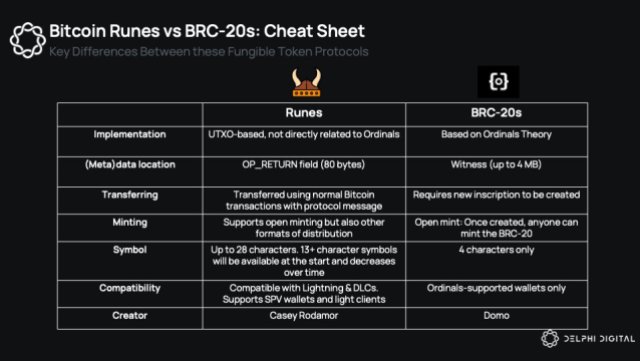With the upcoming Bitcoin Halving, a fresh digital commodity protocol called Runes Protocol is gearing up to enter the cryptocurrency scene. Created by Casey Rodarmor, the innovator behind Ordinal Theory, this newcomer promises to bring about a novel fungible token standard specifically for Bitcoin, sparking excitement in the crypto community.
A study conducted by Delphi Digital, a renowned cryptocurrency research firm, has highlighted how Runes could shake up the token market, potentially dethroning the prevalence of BRC-20s.
A Glimpse Into The Runes Protocol
Instead of being a token itself like its predecessors, Runes functions as a system for generating new coins on the Bitcoin Network. Coins produced following the Runes Protocol are referred to as “Runes,” and they share the property of fungibility, which means each Rune can be exchanged for another of equal value.
Based on the findings of the research company, this token standard possesses distinct characteristics that make it different from other token standards currently available.
Using Bitcoin’s Unspent Transaction Outputs (UTXOs), The Runes Protocol keeps track of balances for both Bitcoin and Runes. As a result, users can quickly generate and exchange Runes right within the Bitcoin network.
The Runes Protocol works to boost openness and protection by shifting reliance from Bitcoin’s indexers to the blockchain itself.
The Runes system stands out with its distinct approach to fair launches. The initial Rune, named UNCOMMON•GOODS (Rune 0), can be minted during the upcoming Halving period up until the next such event occurs.
In the Runes system, each token name needs to start with a minimum of 13 characters. This length restriction will then be progressively reduced until all names are eligible for usage.
Battle Of Token Standards
The market for BRC-20 tokens, which is worth over $1.5 billion, has been leading the way in tokenization. But recently, there’s been buzz about Runes, a new standard, that could potentially take over. According to Delphi Digital’s analysis, there are significant distinctions between the two token frameworks. Runes may bring certain benefits that make it an intriguing contender.
Using the OP_RETURN field in Runes makes it easier and more efficient to generate tokens, as opposed to BRC-20s that necessitate creating new inscriptions each time a token is transferred.
Based on Delphi Digital’s report, Runes offers more options for issuing tokens. It allows for open creation, ensuring a fair distribution process, and the ability to mint tokens for a single address.
Furthermore, Runes offers better compatibility with simplified payment verification (SPV) wallets and Bitcoin Layer 2 (L2) systems, resulting in swifter and less costly transactions.

Potential BRC-20 Upgrades
Although the Runes protocol boasts numerous advantages, it encounters obstacles due to the current stage of infrastructure expansion. According to the report, achieving optimal Runes interoperability faces hurdles because of this developmental phase.
An additional consideration arises when proposing the adoption of the Cenotaph model for protocol enhancements: there’s a risk of misshapen or incorrectly formed “runestones” that could result in lost data.
With increasing popularity of the Runes Protocol, whispers have emerged regarding prospective enhancements to the BRC-20 standard. One of these rumors suggests that BRC-20 indexers may soon be capable of calculating Ethereum Virtual Machine (EVM) smart contract codes.
According to Delphi Digital’s assessment, this new development has the potential to improve upon some of the design challenges encountered with the BRC-20 standard, leading to greater rivalry between the two token creation frameworks.
The crypto community is excitedly looking forward to the upcoming release of the Runes Protocol, as it has the potential to significantly change the way tokens are created and used within the cryptocurrency market.
Delphi Digital’s report highlights the distinct characteristics and benefits of Runes, making it a strong rival capable of contesting the supremacy of BRC-20s.

The front-runner ORDI token in the cryptocurrency market based on the BRC-20 standard is now priced at $45.58. But, it has experienced a notable drop of more than 32% in value during the last month.
Read More
- SOL PREDICTION. SOL cryptocurrency
- USD ZAR PREDICTION
- BTC PREDICTION. BTC cryptocurrency
- CKB PREDICTION. CKB cryptocurrency
- EUR ILS PREDICTION
- USD COP PREDICTION
- USD PHP PREDICTION
- LBT PREDICTION. LBT cryptocurrency
- SHI PREDICTION. SHI cryptocurrency
- Best JRPGs That Focus On Monster Hunting
2024-04-16 06:12